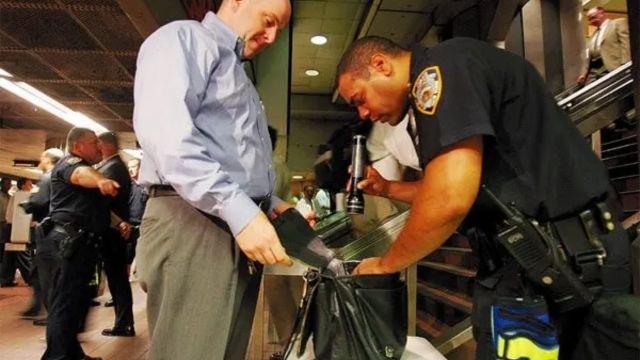In the state of Arkansas, as in the rest of the United States, citizens are protected from unreasonable searches and seizures under the Fourth Amendment of the U.S. Constitution.
Generally, this means that police need a warrant, supported by probable cause, to search your belongings, including your bag. However, there are specific circumstances where law enforcement can conduct a bag search without a warrant.
Understanding when these searches are legally permitted—and your rights during such encounters—is crucial for all Arkansans.
This article delves into the laws surrounding warrantless bag searches in Arkansas, explaining when and why they can happen and how you can protect your rights during these situations.
What is a Warrantless Search?
A “warrantless search” occurs when law enforcement officers search a person or their belongings without first obtaining a warrant from a judge. While the Fourth Amendment generally requires that police obtain a warrant based on probable cause, there are exceptions that allow officers to conduct certain types of searches without one. These exceptions are rooted in public safety concerns, exigent circumstances, or a reasonable suspicion of criminal activity.
In Arkansas, as with the rest of the U.S., certain legal standards allow for warrantless searches, including when there is probable cause, a security-related issue, or an emergency situation. Let’s break down the most common situations where police can search your bag without a warrant in Arkansas.
When Can Arkansas Police Search Your Bag Without a Warrant?
There are several instances in which police in Arkansas may legally search your bag without first obtaining a warrant. Here are the primary exceptions:
1. Stop-and-Frisk (Terry Stops)
The Terry v. Ohio case in 1968 established that police officers can stop and question a person if they have “reasonable suspicion” that the individual is involved in criminal activity. This is commonly known as a “stop-and-frisk.” If the officer believes that the person may be carrying a weapon or evidence of a crime, they are allowed to conduct a limited frisk of the individual’s outer clothing, which can include a search of their bag.
In Arkansas, as elsewhere, the stop-and-frisk rule means that police must have reasonable suspicion of criminal activity to stop you. If they believe you may be carrying a weapon or illegal items, they can search your bag, but the scope of the search is limited to the immediate area and the items that pose a potential threat.
Example: If you are stopped by a police officer in a high-crime area, and they have a reasonable suspicion you might be carrying a weapon or drugs, they can frisk you and search your bag for safety reasons.
2. Searches at Public Events and Security Checkpoints
At public events, such as concerts, sports games, festivals, or large gatherings, police may conduct warrantless bag searches as part of standard security procedures. These searches are often done to ensure public safety and prevent the possession of dangerous items, such as weapons or illegal substances.
In Arkansas, like other states, event organizers and law enforcement typically inform attendees beforehand that bag inspections will be conducted before entry. While these searches are legal due to the security concerns posed by large crowds, they are still subject to certain limitations. Officers can only search bags for specific prohibited items and cannot conduct an overly invasive or lengthy search without further legal justification.
Example: Before entering a sporting event in Little Rock, police may ask to inspect your bag to check for items such as alcohol, weapons, or large containers that could pose a safety risk.
3. Transportation Security (Airports, Train Stations, Bus Terminals)
At transportation hubs, such as airports, train stations, and bus terminals, warrantless bag searches are routine. These locations are often subject to heightened security to prevent terrorism, theft, and other criminal activities. As a result, police and security officers may conduct random searches or require you to submit your bag for inspection as part of the entry procedure.

In Arkansas, like at major transportation hubs across the U.S., these searches are generally aimed at preventing dangerous items from being brought onto transportation systems. If you refuse a bag search, you may be denied entry or face legal consequences.
Example: At an airport in Arkansas, you may be asked to have your bag screened for prohibited items, such as explosives or weapons, before you can board a flight.
4. Probable Cause and Exigent Circumstances
In certain situations, Arkansas police may search your bag without a warrant if they have probable cause to believe it contains evidence of a crime. This is especially true if there are exigent circumstances—an emergency situation where immediate action is necessary. For example, if police are in hot pursuit of a suspect or if they believe that evidence is about to be destroyed, they can conduct a search of your bag without a warrant.
Exigent circumstances can arise in various ways, such as when a crime is being actively committed, a suspect is fleeing, or there is a risk of evidence being destroyed. These urgent situations justify a warrantless search to prevent further criminal activity or loss of evidence.
Example: If police are chasing a suspect who drops a suspicious bag, they may immediately search the bag to preserve potential evidence or prevent the destruction of illegal items.
Your Rights During a Warrantless Bag Search in Arkansas
Even if police have the right to search your bag without a warrant, it’s important to know your rights during these encounters. Here’s a breakdown of what you are entitled to in such situations:
1. Right to Remain Silent
If you are stopped by police and asked questions during a bag search, you have the right to remain silent. You do not have to answer any questions beyond providing identification or basic information that is legally required. It’s always a good idea to remain calm and cooperative, but you have the right to assert your silence if you wish.
2. Right to Know Why You’re Being Searched
If a police officer requests to search your bag, you have the right to ask why the search is being conducted. Police should be able to explain why they are requesting the search, whether it’s due to safety concerns, a reasonable suspicion of criminal activity, or a security measure for an event or public place.
If the officer does not provide a valid explanation or does not have a legal reason to search your bag, you may be able to refuse the search. However, refusal could lead to further questioning or detainment.
3. Right to Refuse the Search (in Certain Circumstances)
In many cases, you have the right to refuse a search of your bag, especially if the officer lacks reasonable suspicion or probable cause. However, refusal may result in further action, such as detention, questioning, or arrest. In the case of public events or transportation hubs, refusal could prevent you from entering the area or boarding your transportation.
It’s important to remain respectful during any encounter with law enforcement, and if you feel your rights are being violated, you may wish to consult an attorney afterward.
4. Right to a Lawyer
If a warrantless search leads to your arrest or charges, you have the right to consult with an attorney. You can request to speak with a lawyer at any point during the process, whether before or after a search takes place.
Balancing Public Safety and Personal Rights
While Arkansas law allows for warrantless bag searches in certain situations, these searches must still meet specific legal standards. Police officers must have reasonable suspicion, probable cause, or legitimate safety concerns to justify such searches. It’s important to be aware of your rights in these situations, especially when it comes to protecting your personal privacy.
By understanding when a bag search is legal and how you can assert your rights, you can handle these encounters with confidence. If you feel your rights have been violated, it’s always advisable to seek legal counsel to ensure that your interests are protected.
GBBC –
New Jersey Police and Warrantless Bag Searches: Understanding Your New Rights
Examining the Legality of Warrantless Phone Searches During Texas Traffic Stops





More Stories
Warrantless Bag Searches in Arkansas: How Police Can Legally Inspect Your Belongings
Warrantless Bag Searches in Arkansas: How Police Can Legally Inspect Your Belongings
Warrantless Bag Searches in Arkansas: How Police Can Legally Inspect Your Belongings